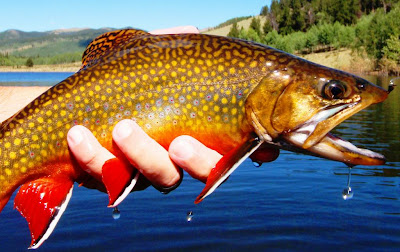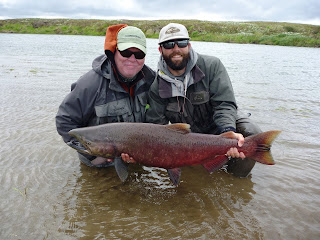Fish 'N Tips Special Announcements
Announcement #1
The date for the RTD FLY Fisherman Club meeting is:
Thursday March 28th 12:00 p.m. - 1: 00 p.m.
Conference Room CCP 10th floor (Confluence)
Bring leader, a fly, nippers (cutters) and a tippet.
Mike is going to show us how to tie some knots and give us some helpful hints. For those of you who are experts, please come and help us rookies. Our goal is to make everyone self sufficient in terms of fly fishing.
Announcement # 2
Good news! Cabella's is opening not one but two stores in the Denver area. How exciting is that!? The store up North is at exit # 226, or the 144th street exit. Down South, they are building at exit #192. Two Cabella' within 34 miles! Aren't we lucky? Both stores are opening by this summer. No longer do I have to drive to Grand Junction or Sidney, Nebraska to visit one of my favorite stores. (Although, we always enjoy a "road trip" adventure. Even the pooch can ride along since Cabella's provides dog kennels)
Visit www.Cabella's.com for more info.
THE BROOKIE
Male Brookie in Fall Mating Colors
Let's continue our discussion on the Brookie. Review the blog post on February 25, 2013. That particular post talks about the ideal conditions for finding the Brook trout.
Always remember that there will probably be other species of trout in the waters you will be fishing. Rainbow and Brown come to mind. If your are new to Brook trout, it could be easy for you to mistake a small Brown for a Brook. So, let's talk about some distinguishing traits. The body can vary with olive, bluish grey, or black color above a belly and lower fins that are reddish in color, and the latter with white leading edges. Bluish halos surround red dots along the flanks. But the real tell tale signs are the spotted dorsal fin and the short worm like markings along its back. Look for a whitish bottom. Also notice the square tail. During the spawn, the male Brook will turn reddish to orange along its sides. (see top photo) Seems like a lot to look for, but trust me when you hook one ..... you'll know. They are very streamed lined and the large mouth extends past the eye. Brook trout can live 7 or 8 years.
As you can tell, I think the Brookies are an amazing species, and I am not shy about pursuing them. I usually use a fly rod to fish for them, but truth be told, I landed a 16 1/2 inch Brook with a Rapala No. 7 on a spin combo. I was actually fishing for Brown and Rainbow. Boy was I surprised, but certainly not disappointed! What a beautiful specimen!!
This is the Rapala #7 lure that I used to catch my 16 inch Brook. These are readily available at your favorite fishing supply spot.
I usually fish for the Brook in small streams that are tributaries of larger rivers that run through some of our state parks or National forests. These shallow trout creeks have lots of brush, fallen trees, and areas that have a lot of exposed gravel beds. This is where I use a fly rod and reel. Because of the tight areas, I usually use a 7 ft. rod with a floating line. This enables me to make accurate casts and provides more maneuverability given all the obstacles that are along the shoreline.
Looking at all of the trout species, Brook trout fishing, with flies, may provide you with the best action you are likely to encounter during the year. Knowing the season will help you to be successful as well. For instance, in early spring they gorge themselves on bottom dwelling insects, so make sure you have nymphs that will match. As the season progresses, insects will vary, so match what you see.
I usually use dry flies. My favorite and most successful is the Adams in sizes 14 - 16 . I am successful with these because I fish mostly in July and August which is a prime time for the dry fly. Now, a lot of fly fishermen will tell you that Brookies love a Hopper dry fly. Never used one so I can't comment on this fly. And, my philosophy is: If it ain't broke, don't fix it! However, something to think about if the Adams fails me. But the thing to remember is that Brooks are easily taken on a variety of flies. You just have to find the one that produces the most fish for you. Keep the time of year and the water levels in mind when deciding on your flies will also help.
Some of my favorites are:

Black Ant
Elk Hair Caddis
Make sure you enter the water slowly and quietly. Too much splashing or quick steps will scare the fish. Walk to the center of the river if you can. Don't worry if it is shallow, you would be amazed at where these fish can hide. Slowly work your way upstream as they feed facing into the current. Earth tone colored clothes will help you avoid being seen by the fish. Be sure no suntan lotion or insect spray has come in contact with your fly. They will detect it and shy away from your presentation. Just remember that if you cannot get into the water, you can fish from the shore. But be careful while moving up the shore line while moving through the bushes and brambles, you do not want to spook the fish by being noisy.
Here is where I put things into practice.
Jack

Jack with an awesome Brown
This is my fishing pal Jack. We refer to Jack as the"Yoda" of fishing. Never misses. We go out for Brookies a couple times a year, and I must confess, we keep our limit. Daily limit for Brook in Colorado is 10 fish 8 inches and smaller. I have always said in my blogs that there is nothing wrong with keeping a few fish to enjoy (see blog from 6/20/11). Brook are the tastiest trout in my humble opinion. Nothing is better than smelling my wife's sliced potatoes and onions frying in the pan and the fish in a pan over the open fire.
Best tasting fish in these parts
Here is an excellent recipe. My wife Carol has used this recipe for years:
1. Gut and clean the fish / leave heads on
2. Rinse thoroughly / pat dry
3. Mix the following :
a. 1/2 cup flour
b. 1/2 cup yellow cornmeal
c. pinch of salt
d. pinch of pepper
4. lightly cover bottom of frying pan with vegetable oil
5. heat oil but do not burn
6. coat fish with mixture inside and out
7. cook on each side for approx. 3 minutes
8. flip over onto belly and cook approx. 2 minutes
9. when fish is flaky, serve piping hot
10. enjoy
Send in your suggestions for your favorite flies, techniques, pictures,etc. Let's discuss.
Try it! You'll like it
'Til next time
Grandpa's Fishing Tips














